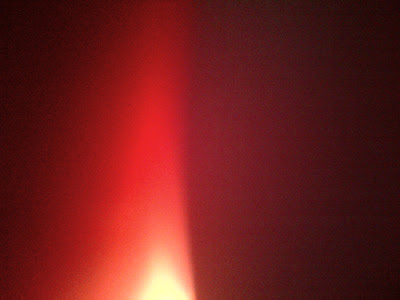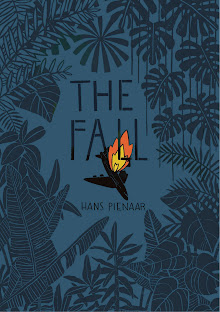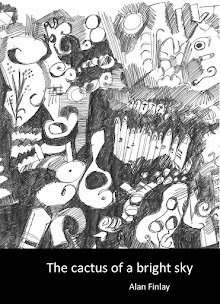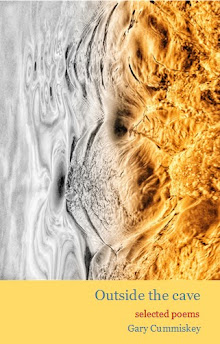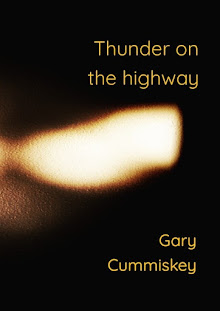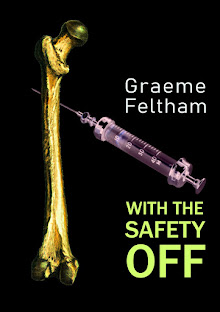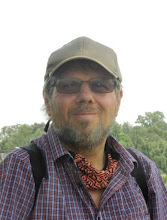Sunday, 30 June 2013
Monday, 24 June 2013
Thursday, 20 June 2013
Hope lights up dark visions: a review of Kobus Moolman's Left Over, by Kayla Roux
Kobus Moolman, a well-published poet, editor, teacher and playwright, launched his newest anthology of poems and musings at the Eastern Star Education Centre in Grahamstown last week.
Taking a break from teaching creative writing at UKZN, he arrived in Grahamstown in April and will be staying until the middle of July, lending a talented hand with the Rhodes MA Creative Writing course.
While I haven't yet had the pleasure of reading any of his previous poetry books, his newest is called Left Over (published by Dye Hard Press) and it had me spellbound...Read more here
Labels:
Dye Hard Press,
Grocotts Mail,
Kayla Roux,
Kobus Moolman,
Left Over
Monday, 17 June 2013
Forthcoming title from Dye Hard Press: fhedzi by Khulile Nxumalo
fhedzi is Khulile Nxumalo's second poetry collection.
90-pages
ISBN: 978-0-9869982-1-8
90-pages
ISBN: 978-0-9869982-1-8
Khulile
Nxumalo was born in Diepkloof, Soweto, in 1971. He finished school at Waterford
Kamhlaba, Swaziland, and went to the University of Cape Town, University of Natal
and Wits University. His first poetry collection, ten flapping elbows, mama,
was published by Deep South in 2004. His work has appeared in several literary
journals in South Africa, Canada, the UK and the US. Nxumalo has twice won the
DALRO award for poetry. He has two
children.
Khulile Nxumalo
is one of the few poets in South Africa using longer experimental forms. He has
found a creative way of breaking up the English language and fusing it with other
languages. He is also capable of intense lyrical expression. – Robert Berold
magma-burn. emotion-lava spilling out. of wounds.
and thoughts of them expressed in ghostly words
of the divining spirit. and coming thru the smog.
and dust,blood-rained on strange children's games.
and ever The Voice, lonesome, wearied, spiralling inward...
with this one,sikhulile! – Lesego Rampolokeng
Labels:
Dye Hard Press,
fhedzi,
Khulile Nxumalo,
Lesego Rampolokeng,
poetry,
Robert Berold
Saturday, 15 June 2013
Review of Alan Finlay's pushing from the riverbank, by Marike Beyers
The poems in pushing from the riverbank move in a space of being where all attempts to hold on to something resist us.“Everything fails, and then is born again.” Returning from holiday, the lawn is overgrown, the cat lost, the neighbour encroaches on the border, the three-year-old fights off the dangers of the world, the beloved suffers, the roles demanded of us seem larger than ourselves. “i say to my son: i love you he breaks free”. There is desolation and amazement in that. There is no match between what life offers and what we need, the poet says - “our needs rest on the twigs of a river crossing”. Yet, he seems to tell us, we continue shaping, trying to interpret what surrounds us.
pushing from the riverbank is Alan Finlay’s fourth collection of poems and although it contains only about 20 poems, prose poems and a few illustrations, it is a large collection in what it asks about - boundaries of self, life, of what words can do. The first poem, wind& sea, starts with an epigraph by Gertrude Stein – “why after a thing is named write about it”. Appropriate, because these writings are a naming, a searching for what is beyond words, where being is in the spaces between.
The poet uses spaces in visibly startling ways, even creating a sense of looking for the possibility of the right and left sides of the poem reading as two interlinking streams in wind& sea and i watch you go. Indents and spaces give a sense of a physical shape to the poem, drawing attention to the textuality of the poem as experience. An example of this is the crescent form of the lyrical poem this evening where the lines and imagery mimic each other.
Writing as a twig across the river of chaos - the poet uses natural images of sun, wind, wood, rivers to describe the relations between people and world, the archetypal relationships between man, woman and child – and these become one, merge in the living, both desolately and intimately so:
"i fish in your gravity
i fish in your give”
he writes in wind& sea
“you recognize your longing
in my falling face
at night i sing for you
all night i walk alone for you”
Family is described as root form of being, yet the losing of self, the shifting boundaries of relationships are presented in the difficulty of naming and in images of pain.
“i wait by your unwound
wound
your deflated body
suture of your sex”
The metaphor of house as a relationship, as a place of fragile safety, as the life of a family, recurs in the collection. This place held in words - “there is a house I have with words”, the poet says. This is a sense of being enveloped in a sense of loss and hurt:
"i wait for you who can turn
back to me
i wait for my last window”
In the context of gender relations the image of the house returns: “You have been punched out woman / and you are the ceiling to this house”. Yet also the speaker’s alienation:
"do you know my name?
the one wound round with
copper silence”
where copper is used as symbol for currency, the demands of the world, the harshness of need. There is the complexity in poems presenting interplay between mother, father and child as archetypal figures. Two poems, the child goes out and the child wants his mother, give us little broken stories, the way we are together and apart:
“…this is how my mother is.’ She is
teaching
the alphabet. B is for
Broken. ….
The son and the father go out into the
dark, to be alone, in the dark together”
and
“The child wants his mother. The child
wants his mother, and mother and mother.
Capitulating through the ages: stone,
tree, wood, bark: laugh.
her laugh, a second sound”
However, there are also poems that function as small family scenes: a mother packing away toys; tired parents after a birthday party; a father and child worrying about money, a prose poem of a child thinking about troubles in his family while hotfooting it to the music shop “just kid-quiet in his own world not have to say anything.” It is difficult not to be touched by the small scenes of interaction between father and son. For example:
“i’m telling my three-year-old child
that the world is not so safe
but he knows already: he’s fighting
dragons with his sword…”
Similarly, there is a homely intimacy in the longer title poem to the collection where the poet is overwhelmed by the demands of the world -
“inbox choking with e-mails
everywhere the world tilting
towards me the day so i
get up at night, four in the
morning get it started
so i can push back…”
and the child climbs into bed with him, wanting to talk, bringing his own fears about “sharks and monsters when / i flush the toilet – remember // those?”. This frightful world of monsters, dreams, economic pressure, tasks and our struggle to find peaceful boundaries all are present in these poems. Part of this frightful world is also the aggression within the self – presented as a growling tiger, sometimes placated to hide in stories and dreams, in writing, but “growling underneath”. It would be foolish, the poet suggests, to think that by reflecting the dangers of the world we negate those threats, even our own violence – “Soon he will turn back to the leaves and you will not hear from him until nightfall”. It is for nightfall that we need poetry this honest. “Life says: I do not hold you. Make of me what you will.” This the poet sees. What do we make of life, day by day – reaching, for words, for those around us, from the leaves, from our darkness. The poet reaches for the day with his frightened child to
“… respond to
e-mails, it’s ok, i love
you, i say i say as if
to repeat myself: and feel the
pull as if i push back with my
legs, from the riverbank
let go gently
so you might understand
into the day.”
Marike Beyers
(Published in NELM News 54, December 2012)
pushing from the riverbank is Alan Finlay’s fourth collection of poems and although it contains only about 20 poems, prose poems and a few illustrations, it is a large collection in what it asks about - boundaries of self, life, of what words can do. The first poem, wind& sea, starts with an epigraph by Gertrude Stein – “why after a thing is named write about it”. Appropriate, because these writings are a naming, a searching for what is beyond words, where being is in the spaces between.
The poet uses spaces in visibly startling ways, even creating a sense of looking for the possibility of the right and left sides of the poem reading as two interlinking streams in wind& sea and i watch you go. Indents and spaces give a sense of a physical shape to the poem, drawing attention to the textuality of the poem as experience. An example of this is the crescent form of the lyrical poem this evening where the lines and imagery mimic each other.
Writing as a twig across the river of chaos - the poet uses natural images of sun, wind, wood, rivers to describe the relations between people and world, the archetypal relationships between man, woman and child – and these become one, merge in the living, both desolately and intimately so:
"i fish in your gravity
i fish in your give”
he writes in wind& sea
“you recognize your longing
in my falling face
at night i sing for you
all night i walk alone for you”
Family is described as root form of being, yet the losing of self, the shifting boundaries of relationships are presented in the difficulty of naming and in images of pain.
“i wait by your unwound
wound
your deflated body
suture of your sex”
The metaphor of house as a relationship, as a place of fragile safety, as the life of a family, recurs in the collection. This place held in words - “there is a house I have with words”, the poet says. This is a sense of being enveloped in a sense of loss and hurt:
"i wait for you who can turn
back to me
i wait for my last window”
In the context of gender relations the image of the house returns: “You have been punched out woman / and you are the ceiling to this house”. Yet also the speaker’s alienation:
"do you know my name?
the one wound round with
copper silence”
where copper is used as symbol for currency, the demands of the world, the harshness of need. There is the complexity in poems presenting interplay between mother, father and child as archetypal figures. Two poems, the child goes out and the child wants his mother, give us little broken stories, the way we are together and apart:
“…this is how my mother is.’ She is
teaching
the alphabet. B is for
Broken. ….
The son and the father go out into the
dark, to be alone, in the dark together”
and
“The child wants his mother. The child
wants his mother, and mother and mother.
Capitulating through the ages: stone,
tree, wood, bark: laugh.
her laugh, a second sound”
However, there are also poems that function as small family scenes: a mother packing away toys; tired parents after a birthday party; a father and child worrying about money, a prose poem of a child thinking about troubles in his family while hotfooting it to the music shop “just kid-quiet in his own world not have to say anything.” It is difficult not to be touched by the small scenes of interaction between father and son. For example:
“i’m telling my three-year-old child
that the world is not so safe
but he knows already: he’s fighting
dragons with his sword…”
Similarly, there is a homely intimacy in the longer title poem to the collection where the poet is overwhelmed by the demands of the world -
“inbox choking with e-mails
everywhere the world tilting
towards me the day so i
get up at night, four in the
morning get it started
so i can push back…”
and the child climbs into bed with him, wanting to talk, bringing his own fears about “sharks and monsters when / i flush the toilet – remember // those?”. This frightful world of monsters, dreams, economic pressure, tasks and our struggle to find peaceful boundaries all are present in these poems. Part of this frightful world is also the aggression within the self – presented as a growling tiger, sometimes placated to hide in stories and dreams, in writing, but “growling underneath”. It would be foolish, the poet suggests, to think that by reflecting the dangers of the world we negate those threats, even our own violence – “Soon he will turn back to the leaves and you will not hear from him until nightfall”. It is for nightfall that we need poetry this honest. “Life says: I do not hold you. Make of me what you will.” This the poet sees. What do we make of life, day by day – reaching, for words, for those around us, from the leaves, from our darkness. The poet reaches for the day with his frightened child to
“… respond to
e-mails, it’s ok, i love
you, i say i say as if
to repeat myself: and feel the
pull as if i push back with my
legs, from the riverbank
let go gently
so you might understand
into the day.”
Marike Beyers
(Published in NELM News 54, December 2012)
Friday, 14 June 2013
Kobus Moolman’s Left Over on Peony Moon
Kobus Moolman was born in 1964 in Pietermaritzburg. He has published five previous collections of poetry, as well as several plays. He has also edited an anthology by South African writers living with disabilities. He has been awarded several literary awards, including the Ingrid Jonker Prize. He teaches creative writing at the University of KwaZulu-Natal in Durban. Left Over is published by Dye Hard Press, Johannesburg.
“There is a relentless asking in Moolman’s poems … Left Over feels like a follow-on to Light and After, a continuation of the growing power of Moolman’s voice as a poet. It’s a voice that opens up as it breaks (breaks up?), resists false closure.”
– Alan Finlay
“Kobus Moolman’s elliptical, foreshortened poetry opens up a world of exploration and heightened experience from which the reader eventually emerges, chastened but delighted. These are poems of acumen, depth and extraordinary pressure.”
– Kelwyn Sole
Read more here
“There is a relentless asking in Moolman’s poems … Left Over feels like a follow-on to Light and After, a continuation of the growing power of Moolman’s voice as a poet. It’s a voice that opens up as it breaks (breaks up?), resists false closure.”
– Alan Finlay
“Kobus Moolman’s elliptical, foreshortened poetry opens up a world of exploration and heightened experience from which the reader eventually emerges, chastened but delighted. These are poems of acumen, depth and extraordinary pressure.”
– Kelwyn Sole
Read more here
Labels:
Alan Finlay,
Dye Hard Press,
Kelwyn Sole,
Kobus Moolman,
Left Over,
Peony Moon
Friday, 07 June 2013
William S. Burroughs' unforgettable characters
William S Burroughs' unforgettable characters. Essay by Michael Spann, text by Burroughs. Published by Inkblot Publications, 2013.
Monday, 03 June 2013
Subscribe to:
Posts (Atom)







